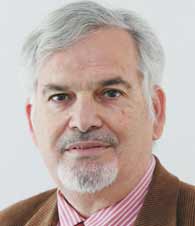|
Interview with Simon L Dolan on Building Ethical Organizations
August 2009
-
By Dr. Nagendra V Chowdary
 Prof. Simon L Dolan
Prof. Simon L Dolan Professor of Human Resource Management and International Organizational Behaviour, Esade Business School. 
With millions of jobs being cut, the
global financial system under serious
stress, and many companies across
the globe going bankrupt, many have
likened this crisis to Great Depression
II?What’s your reading of the current
financial crisis?
What is important is not only the
label, but what is happening. I think
that we are in the midlle of a great
transformation. I think that we will,
for the first time, examine with
honesty the real characteristics of
capitalism. I think that governments
did not have sufficient control
mechanisms, and corporations and
individuals were motivated by greed.
The crisis, is a crisis of confidence
and trust in the economic and the
political systems.
-
You have been in the forefront
making a strong case for honesty and
fairness in organizations. What
according to you are the critical
elements of honesty and fairness in
organizations? What are the
yardsticks to measure the same?
Again, you cannot preach for honesty
and fairness in organizations if people
do not share this idea. I do not believe
that organizations have a spirit of
themselves. I believe that we can talk
about certain people in organizations
that assume the role of imposing their
view/vision about the notion of
efficiency and effectiveness. These
people can change their mind. They
can be educated. So, honesty and
fairness are empty words, unless if
everybody in the organization really
“walks the talk”. I believe in values
that are shared and translated into
action. If values, such as honesty and
fairness are not aligned with the
vision and mission of the company,
they become just another empty
word. As to definition, i believe that
each organization can define
operationally the meaning of these
values. The key is to share the
definition, to believe in it, and to
translate it into action. -
In your years of teaching and
researching on honesty and fairness,
you would have come across quite a
few companies known for their best
practices. Can you please name a few
such ‘honest’ and ‘fair’ companies
and what can we learn from those
companies’ honest and fair practices
over the years?
Of course i can give you examples.
All my examples are connected with
the notion of companies behaving
‘professionally’. Professions are those
occupations that are governed by a
code of ethics (you do not expect a
professional lawyer to lie and go to
court for his/her employer and lie for
the benefit of his employer); you do
not expect a medical doctor to not be
hygenic when treating a patient just
because he had received instructions
from his employer for washing his
hands after examining 10 patients).
Professionals are governed by their
occupation. Their loyalty is first and
most to their occupation. Drawing a
parallel to the organizational level,we
can say that honest and fair
organizations promote transparency
and a culturewhere everything can be
discussed and dealt with. These are
not utopic organizations; rather, they
have instilled the kind of culture that
characterized the real professionals
(as per examples above) in the true
sense of the word. These
organizations might have conflicts
and problems of managing people
and assets like any other organization,
but what places them apart is the
courage of their leaders to be
transparent, ethical and professional
in every deed and engagement. Many question the relevance of
business ethics as a course in MBA
programs arguing vehemently that,
‘you cannot teach someone to be
ethical, after all’. What has been your
experience in delivering this course?
We, in the business schools, do not
(unfortunately) teach students to
become effective managers. We teach them and help them develop
competences that have to do with
understanding of themselves and the
corporate world around them. We
provide them tools for analysis. For
years we thought in the business
schools that the only tools that are
relevant are those connected with the
hard skills (accounting, finance,
marketing, etc.). Today, we realize that
soft skills are also important to
succeed. The problemis that it is very
hard to teach these soft skills. Being
ethical, or following business ethics
is one of the necessary soft skills.
Nonetheless, students understand
the importance of this concept, and if
the course is delivered correctly they
also understand that ethics or being
ethical for an organization is one of
the non-tangible assets of the latter.
Albeit the fact that it cannot be
measured directly, research has
proved repeatedly that it is adding
value (including economic value) to
the organization. Students
understand that in the long term,
even the survival of the company can
depend on the ethical reputation of it.
So, i think that business ethics,
especially in the kind of economic
world that we see today, should be a
must in all business curriculum.
|
